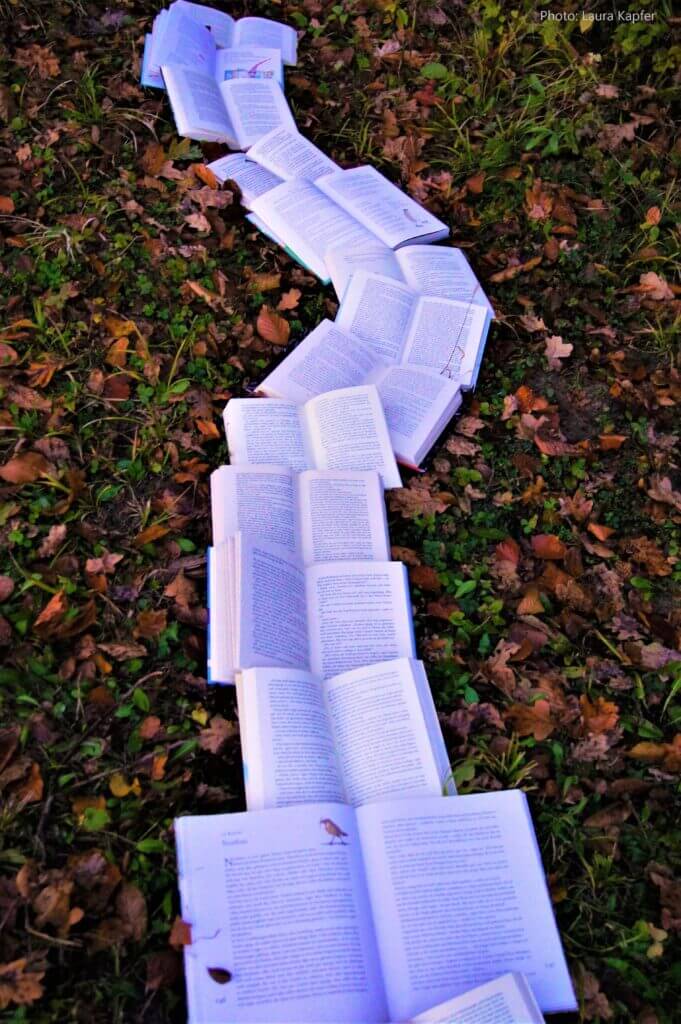
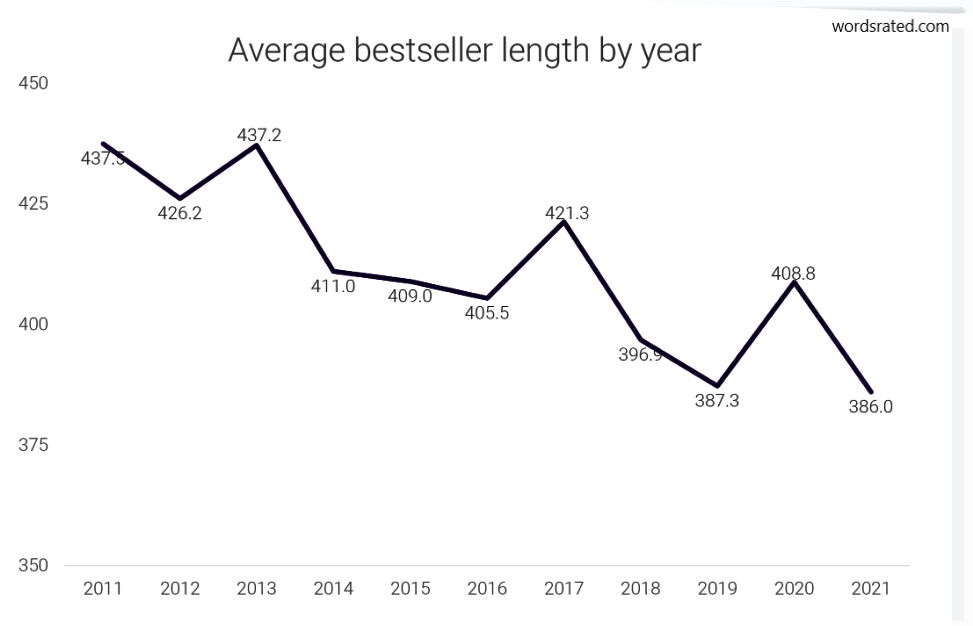
Key findings:
- Bestsellers are getting shorter – the average length of the NYT bestseller decreased by 51.5 pages from 2011 to 2021, from 437.5 to 386 (11.8%).
- Long books (over 400 pages) are disappearing – the share of long bestsellers went from 54% in 2011 to 38% in 2021, a 30% drop.
- Long books stayed 4.4 weeks longer on the bestsellers list than short books (under 400 pages) until 2016. Since 2016, short books have been on the list 1.9 weeks longer than long books.
- People read longer books during winter – bestsellers are 35 pages (8.2%) shorter from April to September (392 pages) compared to October through March (427 pages).
Why are books getting shorter?
Publisher’s preference:
In recent years, many publishers are choosing to focus on smaller and more refined books. Publishing short books allows the publisher to be more current, almost journalistic, and reach readers concerned about contemporary problems faster.
Reading Habits Linked to Weather:
Colder weather brings people indoors and they have more time to invest in reading longer books, than they do during warmer weather. The study looked at the average length of bestsellers broken down by months. The data shows that readers have a tendency to read longer books during the first/last 3 months of the year (wintertime), while bestselling books released during the spring and summer are shorter, making them better choices for vacation and “easy beach reads”. “Bestselling books are on average 35.2 pages shorter from April – July compared to October – March.”
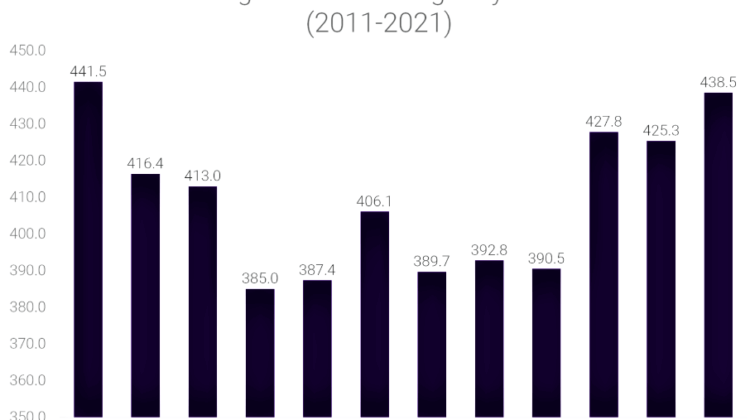
An increase in variety:

As the expression goes “variety is the spice of life”. However, as any good chef knows, sometimes having too many spices in the kitchen can lead to over flavoring, and underestimating the gift of simple dishes. It’s similar to choosing a TV show or movie to watch. Many of us have multiple watching platforms available for us at the touch of a button. And yet, we can easily find ourselves spending our “relaxing TV watching time” with multiple windows open jumping from one show to another. When it comes to choosing a book, it’s no different. The digital age brought a huge increase of various types of content vying for people’s attention and time. People have more options than ever on how to spend their reading time.
Less time to read:
Even with all the benefits that regular reading brings, people tend to read less and less over the last few years as they are busier than ever.
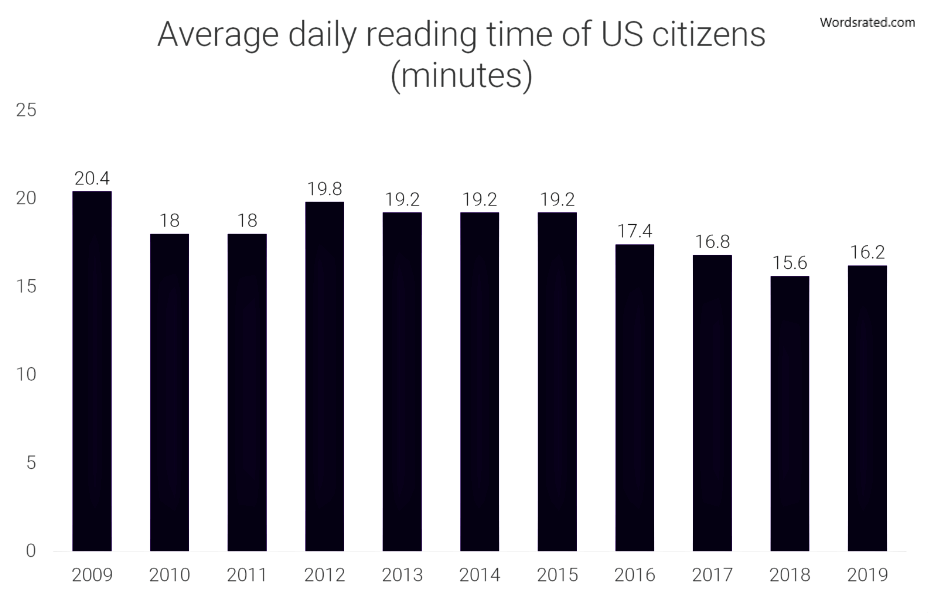
Cognitive Decline Among Baby Boomers:
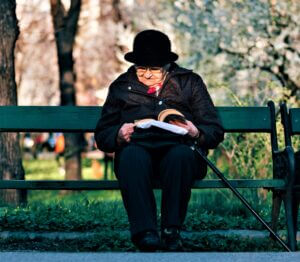
A nationwide study revealed an unexpected reversal of trends: The American ‘Baby Boomer’ generation scored lower in large-scale cognitive testing than members of older generations. (beingpatient.com)
The cognitive health of adults aged 50 or older has traditionally improved from one generation to another. American Baby Boomers mark the first reversal in that trend: The generation born between 1948 and 1959 are showing unexpectedly lower cognitive function in their 60s and early 70s than their predecessors according to a 2020 study published in The Journals of Gerontology.
With more than 55 million people living with dementia worldwide, and nearly 10 million new cases every year, the increased rates of Dementia (which affects memory, thinking, orientation, comprehension, calculation, learning capacity, and language). All of this could be part of the reason why books are getting shorter, as shorter books are easier to read and remember the story, then again, perhaps older folks are too busy living their lives to sit down with a large novel anymore.
Younger Generations are unable to focus as well as generations before:

Generational research is an inherently complex process often awash in normative preconceptions, stereotypes and biases. Gen Z deserves a fairer shake, and Baby Boomers deserve our patience and understanding.
Correlation is not causation and although these are all potential factors of why novels are getting shorter, the truth is we need a more data and an open more nuanced conversation to explore this trend.
An avid book reader and proud library card holder, Angela is new to the world of e-Readers. She has a background in education, emergency response, fitness, loves to be in nature, traveling and exploring. With an honours science degree in anthropology, Angela also studied writing after graduation. She has contributed work to The London Free Press, The Gazette, The Londoner, Best Version Media, Lifeliner, and Citymedia.ca.
